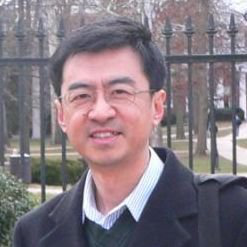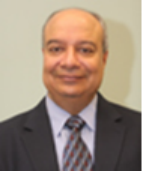Keynote Speaker I

Dr. Chiman Kwan, President
Signal Processing, Inc., Rockville, Maryland, USA
Title: Object tracking and classification in videos using compressive measurements
Abstract: Multiple object tracking using radar, optical, and infrared sensors have found widespread usage in many applications. In the above applications, the sensor data are normally in their original format. In the past decade, compressive sensing has gained popularity in various applications. Compressive measurements are normally collected by multiplying the original vectorized image with a Gaussian random matrix. Each measurement contains a scalar value and the measurement is repeated M times where M is much fewer than N (the number of pixels). To track an object using compressive measurements, it is normally done by reconstructing the image scene and then conventional trackers are then applied. One problem with the reconstruction-based approach is that it is extremely time consuming to reconstruct the original frames and hence, this may prohibit real-time applications. Moreover, information may be lost in the reconstruction process. In this talk, we will detail an object tracking and classification approach in the compressive measurement domain. First, a deep learning tracker known as You Only Look Once (YOLO) is used for object tracking. The training of YOLO tracker is very simple, which requires image frames with known target locations. Although YOLO can also perform classification, the performance is not good as we have very limited number of video frames for training. So, in the second step of object classification, we decided to use a residual network (ResNet) for classification. That is, the object locations detected by YOLO are fed into the ResNet for classification. We will present application scenarios using numerous low quality infrared and optical videos to demonstrate that the proposed approach works quite well as compared to conventional methods.
Bio.: Chiman Kwan received his BS (honors) with major in electronics and minor in mathematics from the Chinese University of Hong Kong in 1988, and MS and Ph.D. degrees in electrical engineering from the University of Texas at Arlington in 1989 and 1993, respectively. He is the founder and Chief Technology Officer of Signal Processing, Inc. and Applied Research LLC, leading research and development effort in real-time control, chemical agent detection, biometrics, speech processing, image fusion, remote sensing, mission planning for UAVs, and fault diagnostics and prognostics.
From April 1991 to February 1994, he worked in the Beam Instrumentation Department of the SSC (Superconducting Super Collider National Laboratory) in Dallas, Texas, where he was heavily involved in the modeling, simulation and design of modern digital controllers and signal processing algorithms for the beam control and synchronization system. He later joined the Automation and Robotics Research Institute in Fort Worth, where he applied intelligent control methods such as neural networks and fuzzy logic to the control of power systems, robots, and motors. Between July 1995 and April 2006, he was the Vice President of Intelligent Automation, Inc. in Rockville, Maryland.
Over the past 28 years, Dr. Kwan has served as Principal Investigator/Program Manager for more than 115 competitively selected projects with total funding more than 36 million dollars from various government agencies and private companies such as Ford, Motorola, Boeing, Honeywell, and Stanford Telecom. He has 15 issued and pending patents, 55 invention disclosures, 325 journal and conference papers, and 500+ proprietary technical reports. He received numerous awards and recognitions from NASA, US Navy, US Air Force, and IEEE.
Keynote Speaker II

Prof. Wenbing Zhao
Department of Electrical Engineering and Computer Science, Cleveland State University, USA
Title: Complex Human Activity Recognition in Human Patient Simulation
Abstract: Human patient simulation (HPS) has been used for over 40 years in medical and nursing education. HPS is a training and feedback method in which learners practice tasks and processes in lifelike circumstances using models. While HPS has been widely adopted in nursing programs gloablly, its effectiveness is severely handicapped by the lack of reliable and efficient methods to provide objective assessment and feedback to students. In this talk, Dr. Zhao will introduce his team’s preliminary work on building a system that aims to automatically recognize the complex activities involved in HPS and provide realtime as well as offline on-demand precise feedback regarding the trainee’s performance during the HPS.
Bio.
Dr. Zhao is a Professor at the Department of Electrical Engineering and Computer Science, Cleveland State University. He got his BS and MS degrees from the Physics Department in Peking University. He earned his Ph.D. at University of California, Santa Barbara in 2002. He has over 200 peer-reviewed publications. Dr. Zhao’s research spans from dependable distributed systems to human centered smart systems. His research has been funded by the US NSF, US Department of Energy, US Department of Transportation, Ohio Bureau of Workers’ Compensation, Ohio Department of Higher Education, the Ohio Development Services Agency, and Woodruff Foundation. He has delivered more than 10 keynotes, tutorials, public talks and demonstrations in various conferences, industry and academic venues. Dr. Zhao is an associate editor for IEEE Access, MDPI Computers, and PeerJ Computer Science, and a member of the editorial board of several international journals, including Applied System Innovation, Internal Journal of Parallel, Emergent and Distributed Systems, and International Journal of Distributed Systems and Technologies. He is currently an IEEE Senior Member.
Keynote Speaker III

Prof. Ian Robert McAndrew
Capitol Technology University, Maryland, USA
Title: Aviation Cybersecurity Issues for Unmanned Vehicles to fly Beyond the Visual Line of Sight
Abstract: Aviation is now remote in real terms with unmanned vehicles in the air, land and sea. It is now more critical that the Cybersecurity issues have implications for safety, reliability and efficient operations. This research discusses how and why data transfer within these vehicles and with those around now with ever more invasive hacking what practical solutions are available for all ends of the economic market. In particular, the advancements in cyber programming that can be integrated to ensure unmanned vehicles are safe from external hacking. This one issue is the single most items needing solutions before legislation will support their use beyond the visual line of sight.
Bio.
Prof. Ian R. McAndrew PhD is a Mechanical Engineer that has worked in education for over 27 years. His teaching and research has been globally, starting in London and now with Capitol Technology University where he is the Dean of Doctoral Programs. He has taught in over 20 countries and published with many academics from all over the world. He has 6 degrees, also a qualified Electrical Engineer and FRAeS. He has supervised over 50 PhDs and has almost 60 peer reviewed publications. His current research is in aerodynamics and low speed flight. He is a keen supporter of conferences as this is where junior researchers can develop their skills for a life in research. He is frequently invited to deliver Keynote speeches and is the Chair of several International Conferences. Additionally, he is the editor or assistant editor in chief of several International Journals.
Keynote Speaker IV

Prof. Hesham H.Ali
University of Nebraska at Omaha Omaha,USA
Title: Innovative Population Based Approaches for Analyzing Big Biological and Mobility Data in Biomedical Informatics
Abstract: With continuous advancements of biomedical instruments and the associated ability to collect diverse types of valuable biological data, research studies have been recently focused on how to best extract useful information from the ‘Big Data’ currently available. The currently available data is not only massive in size, but it also exhibits all the features of complex big data systems with a high degree of variability, veracity and velocity. In addition, the last several years have witnessed major advancements in the development of sensor technologies and wearable devices with the goal of collecting data to be used in various application domains. Although these developments are certainly welcomed, so much left to be done to take full-advantage of the data gathered by such devices. The most critical missing component is the lack of advanced data analytics. How to leverage this raw data to advance biomedical research and improve health care through personalized and targeted medicine, can be considered one of the most exciting scientific challenges of our generation. In this talk, we propose new big data population-based algorithms and tools to analyze different types of biological and mobility data for the purpose of advancing biomedical research and improving healthcare. We employ a population analysis model to assess health levels of individuals as well as to predict health hazards in various medical applications. We also utilize graph-theoretic mechanisms to zoom in and out of the population networks and extract different types of information at various granularity levels to help with prevention, early diagnosis and treatment of infectious and neurodegenerative diseases.
Bio.
Hesham H. Ali is a Professor of Computer Science and Lee and Wilma Seemann Distinguished Dean of the College of Information Science and Technology at the University of Nebraska at Omaha (UNO). He also serves as the director of the UNO Bioinformatics Core Facility that supports a large number of biomedical research projects in Nebraska. He has published numerous articles in various IT areas including scheduling, distributed systems, data analytics, wireless networks, and Bioinformatics. He has also published two books in scheduling and graph algorithms, and several book chapters in Bioinformatics. He has been serving as the PI or Co-PI of several projects funded by NSF, NIH and Nebraska Research Initiative in the areas of data analytics, wireless networks and Bioinformatics. He has also been leading a Research Group that focuses on developing innovative computational approaches to model complex biomedical systems and analyze big bioinformatics data. The research group is currently developing several next generation big data analytics tools based on the concept of population analysis for mining various types of large-scale biological and medical data. This includes the development of new graph theoretic models for analyzing large heterogeneous biological and health data associated with various biomedical research areas, particularly projects associated with infectious and neurodegenerative diseases, microbiome studies and aging research. He has also been leading two projects for developing secure and energy-aware wireless infrastructure to address tracking and monitoring problems in medical environments, particularly to study mobility profiling for advancing personalized healthcare.